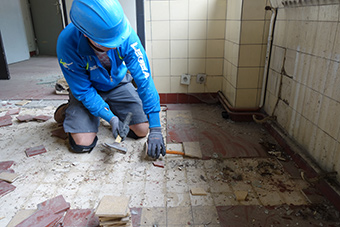The aim of the “Bâti Bruxellois, Source of New Materials (BBSM)” project is to use end-of-life materials from the construction industry and develop a tool for managing and upcycling construction waste. The aim of the BBSM project is to demonstrate that end-of-life materials are valuable resources: reintroducing them into a cyclical production process is a positive step for sustainable development in the Brussels-Capital Region (BCR).
- 18 September 2019
The preliminary results of the project highlight the actions that can be taken to encourage reuse in the Brussels-Capital Region, in particular through a booklet (Objectif Réemploi (Reuse Objective)), a case study (Déconstruction et réemploi : comment faire circuler les éléments de construction? (Deconstruction and reuse: how to circulate the elements of construction)) published by the PPUR, and a report on Reuse and CE marking by Rotor.
The goal of the project is to study and analyse the “urban metabolism” of the Brussels-Capital Region (BCR) in a key sector—the construction industry—with the aim of identifying and encouraging the creation of positive-value loops and eliminating the concept of waste The analysis takes a bottom-up approach based on studying representative typologies in Brussels and extrapolating the results over a regional scale.
A tool for upcycling construction waste
The research also examines the opportunities for creating new channels offered by the sector’s entire value chain; the technical and legal aspects related to recovery (re-use and recycling); and the impact of design on potential current and future use of end-of-life materials as new materials (reversible design and design for change).
The ultimate goal is to devise a tool for anticipating, planning, managing and successfully exploiting the local material resources of the building stock and construction industry in the BCR.
Communication within the project
To date, the BBSM project has produced several diverse publications: articles, scientific reports, books, as well as documents or reports from workshops organised within the framework of the project.
In addition, the BBSM project has been presented at a dozen events, both regional and European or international: conferences, symposiums, seminars, workshops, study days, radio broadcasts, newspaper articles, etc. Three BBSM meetings and several workshops and themed seminars have also been organised since the start of the project.
A focus on communication underpins one of the project’s objectives, which is to encourage, stimulate and action a real change in mentalities and practices in the construction sector. This is part of a shift towards a circular economy and better sustainability, but it will also support public authorities in this approach by providing them with the necessary knowledge and advice to implement this transition within the sector.
Strong links between researchers and enterprises
It is still too early to calculate the number of jobs created by this project. Nevertheless, after 45 months of research, the ERDF-BBSM project has funded two PhD researchers who have been specifically recruited for the project, as well as a researcher hired for a 6-month period, for a total of two full-time equivalents. The project has also made it possible to sustain both the research itself and the researchers within their entities. In total, 11 researchers and experts have worked on BBSM since the project started, at an average of 3.14 full-time equivalents per year. Ultimately, the project has helped establish strong links between researchers and companies in the reuse and upcycling sector.
In summary, the BBSM project has impacted the region and actors from the construction sector through the production and sharing of data with other factions of the sector (architects, entrepreneurs, public authorities, etc.) through various channels (websites, publications, conferences, etc.). In addition, the use of networking and active participation (consultancy/advice) in discussions has fostered the implementation of a more circular construction sector.
Total investment and European funding
Total investment for the ‘Bâti Bruxellois, Source of New Materials (BBSM) ’ project is EUR 1 156 322; the European Regional Development Fund contribution is EUR 538 861 through the ‘ERDF PO Brussels Capital Region/ EFRO OP Brussel Hoofdstedelijk Gewest’ cooperation programme for the 2014-2020 programming period. The investment is part of the "Energy Union and Climate" priority.

